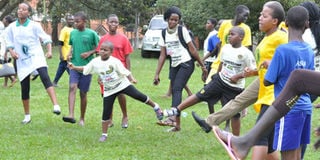How to encourage physical exercise among your children

Children can keep active and fit by engaging in exercises such as physical education. Experts say many schools have ignored physical activity in favour of academics. File photo
What you need to know:
- Children must be up and about working their bodies, with parents encouraging their best efforts.
- But how does an average parent encourage physical activity among his or her children?
Sarah has three beautiful children, all under 10 years of age but her complaint is one: “They don’t like to go anywhere or to play outdoors. They are always busy hooked onto their tabs and every attempt to get them outdoors is a fight with them. They don’t like to listen and I am frustrated. I don’t know what to do!”
If you are a parent like Sarah, you probably are frustrated that your children spend a lot of time indoors and on screens. You know the dangers of a sedentary lifestyle and you want to protect them but you live in a gated environment where there is little room to play.
In our time of growing up, we enjoyed the outdoors and nature. There were little distractions; we climbed trees, worked the gardens, fetched water, and ran around the village half-naked but who cared?
Physical exercise has tremendous benefits for children’s overall well-being such as:
It improves cardiovascular health, memory, clarity, and attention; and maintains their sugar levels. Physical exercise also strengthens their bones and muscles; and improves their motor skills aiding them to move better and function better.
It helps them avoid diseases such as type 2 diabetes, and obesity.
Research also suggests that physically fit children do better in school than children who are not.
To get the above benefits, however, children cannot be living a sedentary lifestyle. They must be up and about working their bodies, with parents encouraging their best efforts. But how does an average parent encourage physical activity among his or her children? Here is how:
Positive influence
Children learn best and quickly from their parents or caregivers. Be the parent or caregiver who goes outdoors and spends time there. Be the parent who exercises through a sport or game, or just plainly via calisthenics. In doing this, you will be inspiring them to want out of the house too.
“I used to be lazy on physical exercise until I realised I would wake up feeling tired, and with difficulty. So I enrolled into a nearby gym and started working out. I enjoyed myself and would come back feeling better about myself and talking about it to my children. Surprisingly, my older son, who is 13, started going with me. Two hours at the gym were substituted with two hours of television and computers. He doesn’t admit to me that I inspired him but I know I did,” Marjorie, a mother of one says.
Limit screen time
Create specific time blocks for specific activities. They could for instance watch TV only at night while during the day they are helping out with house chores or being useful in other ways at home. Or create for them alternative past-times such as learning a new language, taking musical classes, or joining a children’s swimming club can be helpful in encouraging them to do exercise.
And Sharon did: “During holidays, I make sure my children are enrolled in something productive; the eldest likes music so he is in music school, while the youngest likes swimming, so I entered her into a local swimming club for the pool near our home. If you don’t create these activities for your children, they will spend the whole time glued to screens or loitering around your neighbours’ homes and you do not want that, do you.”
Incorporate physical activity into their daily routines
This is pretty simple; Hadijah, a mother of two adolescent boys, says: “I used to fear exposing my children to ruffians in the markets and roadsides but you cannot protect your child forever. They must grow up to be independent. So I decided I would expose them to the world little by little. Now, I often send them to pick stuff up from the nearby shops and recently I stopped picking them up from school (which is about two kilometres away from our home). I drop them at school every morning because it is on the way to my workplace but I let them walk back home with their friends every day. It is healthy for them. I also let them wash my car.”
Encourage variety of physical activities
It cannot be only running but you can include walking, swimming, dancing, playing tennis…this helps to reduce the monotony with the same activity and as well as keeping their motivation levels high.
Diana, a mother of three, says: “I am quite adventurous. I like to climb mountains, camping and run in every marathon in this town. In the process, I take my children with me. They enjoy these activities because we see them as challenges to overcome. I usually give them gifts that promote physical activity such as smart watches that have technologies that track activities. In the long run, yes they are becoming healthy, but also their minds are becoming resilient to life's challenges.”
Take them out of their comfort zones
For some of us it is unimaginable that our children can be some where away from us and still be okay. We think this way because we are accustomed to being the helicopter or hovering parents. But the opposite is true.
Jimmy explains: “I think outdoors should not only be physical exercises but even doing chores that flex muscles is equally important. I have made it a custom that my children spend their long Christmas holidays in our village. My parents take care of them and they learn to work with their hands as they help out with domestic chores like washing dishes, digging, and planting. This keeps their bodies active and away from gadgets that are just a source of all sorts of evil.”
Make physical exercise a social and fun experience
One of the reasons why some adults keep going back to gyms is the sociability of it. We meet or make friends there and want to catch up. Same with children. Invite the neighbours children to exercise with yours. Let them compete among themselves and award them prizes. Or allow them to take turns at skipping the rope, or running or swimming. These will motivate them to want to do more. As they enjoy and play, they are inadvertently exercising their way to health.
In conclusion, there are a variety of ways through which you can encourage your children to exercise. Be creative and your children will thank you for it.



